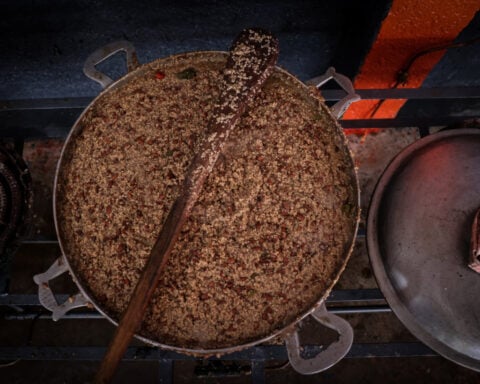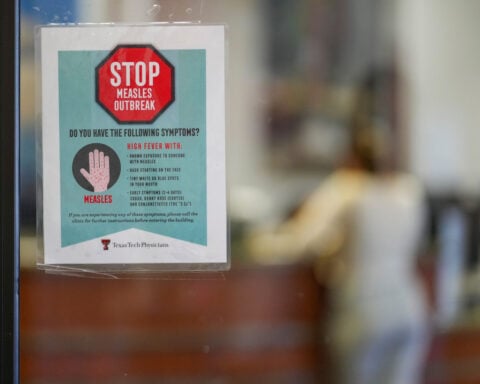(CNN) — The battle over the health merits of various cooking fats has never really gotten below a simmer — but it’s starting to heat up again.
Beef tallow and other animal fats, including pig lard and butter, were traditionally used as the main cooking fats in the United States up until the early 20th century. A shift occurred in the early to mid-20th century, when scientists started looking into the consumption of animal fat as the culprit behind the uptick of cardiovascular issues. Vegetable and seed oils that had largely been used for industrial purposes — such as soaps, machinery fuel and candles — started to be widely promoted as heart-healthy alternatives to animal fats.
And indeed, research has shown that plant-based oils, such as olive and canola oil, may be better for certain health outcomes than animal-based fats, like butter.
Now US Health and Human Services Secretary Robert F. Kennedy Jr. says he’s on a crusade to “make America healthy,” and seed oils are among his targets. Kennedy’s campaign website still sells hats embroidered with the phrase “make frying oil tallow again.”
“Seed oil is one of the components of processed foods, and all the science indicates that ultraprocessed foods are the principal culprit in this extraordinary explosion, the epidemic we have of chronic disease,” Kennedy said in a recent interview with Fox News host Sean Hannity at a Steak ’n Shake in Florida.
Kennedy said he wants to “incentivize” companies to switch to “traditional ingredients like beef tallow,” after Steak ’n Shake had announced in January it would fry its fries in beef tallow. After the Hannity interview, Steak ’n Shake clarified that its suppliers are still currently par-frying its fries, onion rings and chicken tenders with vegetable oil prior to shipping them to restaurants.
While seed oil is found in ultraprocessed foods, and there are studies linking ultraprocessed foods to many health conditions, there are also studies linking the consumption of animal fats to adverse health outcomes.
Decades of research have produced a “wealth of data” showing that diets higher in plant fats result in better health outcomes than diets higher in animal fats, said Dr. Alice H. Lichtenstein, the Stanley N. Gershoff Professor of Nutrition Science and Policy at Tufts University in Boston.
“I think it would be detrimental to increase our intake of animal fat and decrease our intake of plant oils,” Lichtenstein said. “I would say that (beef tallow) is less healthy because it’s higher in saturated fat, and I don’t see any advantage.”
But the debate, which often plays out on social media, is complicated. Not all vegetable oils are seed oils — olive oil and avocado oil, for example, are plant-based fats extracted from the flesh rather than the seed. And tallow isn’t the only animal fat: Butter, lard and ghee are also in that category. And no matter which cooking fat you choose, you shouldn’t eat too much of any of them, experts said — especially in fried foods.
So, what’s the controversy about beef tallow and seed oils all about?
What is beef tallow?
Beef tallow is the fat rendered off from the fat trimmings and leftovers from butchering cows, which can include organs and other meat, said Dr. Eric Decker, a professor of food science at the University of Massachusetts Amherst. It’s primarily a saturated fat, which is mostly found in animal foods.
Beef tallow can be made at home or commercially in rendering plants.
Home cooks can heat the fat trimmings and other byproducts the stove or in the oven, typically at around 180 to 200 degrees Fahrenheit for several hours, said Dr. Cate Shanahan, a family physician in Florida who has long elevated concerns about health impacts of seed oils. That process separates the fat from any proteins, water and other fluids. The contents can then be poured through a cheesecloth into a storage container.
At a rendering plant, the process is generally the same, but the fat needs to be cleaned if there are too many free fatty acids, which can harm the tallow’s quality and longevity, Decker said. Similar to what refined oils go through, the tallow may need neutralization — a chemical refining process usually involving an alkaline solution that’s basically baking powder, which separates free fatty acids from the tallow. Then the tallow is ready for cooking.
What are seed oils?
Seed oils are polyunsaturated fats extracted from the seeds of various plants. Canola oil, for one, derives from seeds of the canola, or rapeseed plant, while soybean oil comes from soybean plant seeds.
Producing these oils requires industrial processing. The seeds are crushed twice under high heat and pressure then exposed to hexane, a colorless liquid hydrocarbon and solvent, experts said. The hexane dissolves the lipid components in the oil, then is evaporated off and recollected for later use. That results in a crude oil that’s dark in color.
“You’re trying to get as pure of a triglyceride fraction as possible,” Decker said. “Some of the things that are in that oil are things like phospholipids,” which emulsify water in the oil and can cause browning when the oil is heated at high temperatures.
Phospholipids are removed by degumming, which “is basically washing the oil with some citric acid,” Decker said. Next is the neutralization process for removing free fatty acids.
There’s also a bleaching step to make the color consistent, Decker said. “It’s also important because some of the oils will have chlorophyll in them, and chlorophyll makes the oil oxidize fast,” he said.
The last major step is deodorization, and “that’s just injecting steam through the oil” to remove unappetizing flavors that came from the seeds or from processing, Decker added.
Some critics point to the chemical refinement process as a reason why seed oil may be unhealthy, but the chemicals used “are very benign,” Decker said. In “most studies on toxicology of hexane, you only really see problems with people that have occupational exposure — people that really every day are exposed to fairly large levels.”
The residual levels in oils, on the other hand, are low and further evaporated when the oils are cooked, said Decker, although he noted there’s little research on the topic.
The seed oil debate
Shanahan, author of “Dark Calories: How Vegetable Oils Destroy Our Health and How We Can Get It Back,” has been a vocal critic of seed oils since 2002, when she said she started learning information that contradicted her medical training. She devised what she calls the “hateful eight” list of seed oils: canola, corn, cottonseed, grapeseed, soybean, sunflower, safflower and rice bran oils.
More recently, the movement around seed oil avoidance has taken off online and become a cause for Kennedy, who often argues for improved nutrition as a tool against chronic and infectious disease, while downplaying the protection provided by vaccines and questioning some therapeutics.
Much of the concern about seed oils centers on the fact that due to their high linoleic acid content, seed oils have much more omega-6 than omega-3 fatty acids, whereas a balanced ratio of the two in the body is best for health. There’s already an imbalance in the typical Western diet due to widely available seed oils used in fried fast foods and ultraprocessed foods the comprise roughly 70% of the United States’ food supply.
Various studies have linked diets too high in omega-6 with inflammation, which is associated with many chronic diseases including cancer, depression, Alzheimer’s disease, heart disease, diabetes, asthma and arthritis.
A federal official says Kennedy’s concern has to do with that imbalance and its possible links to chronic health conditions. “The switch to alternative cooking methods, like beef tallow, is a step closer to ending the chronic disease epidemic and to Make America Healthy Again,” the official said via email.
Others, including Shanahan, argue for switching fats based on the chemistry of polyunsaturated fats — the primary fat in seed oils. Saturated fats have a single bond between the carbon atoms in their chains, whereas polyunsaturated fats have one or more double bonds — making them less stable and prone to faster peroxidation when exposed to oxygen or when cooked, according to Dr. Daisy Zamora, an associate professor at the University of North Carolina’s School of Medicine.
“Omega-3 fatty acids need to go through enzymatic oxidation for the beneficial derivatives to form,” Zamora said. So while oxidation can be good, Zamora added, peroxidation is a process in which unstable molecules known as free radicals attack fats containing double bonds. Free radicals are linked to cellular damage and oxidative stress, an imbalance between free radicals and antioxidants in the body. Peroxidation of these oils may also produce potentially harmful compounds, she said.
These factors, as well as the chemical refinement process, are the reasoning behind Shanahan’s “hateful eight” list. Beef tallow can also oxidize and degrade since it has a low amount of unsaturated fat, Decker said, but it takes much longer. Beef tallow also retains more nutrients than seed oils do, though both have some degree of essential fatty acids, experts said.
Decker said the risks of harmful products of degradation may not come into play inherently, but rather when the oils are cooked too hot, used repeatedly or kept for too long. Some restaurants are better than others at maintaining their oil quality and controlling temperatures when frying, he added.
“There is a potential that people are consuming rancid oil, but we don’t really know a whole lot about how those oxidation products impact health,” Decker said. “That research is very much in its infancy.”
Zamora said potential impacts are getting clearer. In her own clinical trials with Dr. Christopher Ramsden of the National Institutes of Health, they investigated the effects of different fatty acids on chronic pain in humans.
The diets in her studies are “consistent with dietary guidance for Americans,” Zamora said. “It’s not unhealthy, and it has the average US intake of linoleic acid and omega-3 fatty acids. … But the difference is that we give them bottles of oil that are different.”
The low-linoleic acid group received a bottle comprised of 75% macadamia nut oil and 25% olive oil, whereas the high-linoleic acid group’s bottle was 75% corn oil and 25% olive oil.
“What we have shown is that reducing linoleic acid really does reduce pain in people with chronic migraine,” Zamora said. “That high-omega-3 (and) low-omega-6 group had more reduction in pain compared to just increasing omega-3 alone.”
Additionally, Zamora and Ramsden’s 2016 meta-analysis of randomized clinical trials from Minnesota Coronary Experiment of the 1960s and 1970s — which also included previously unpublished data from the experiment — found although replacing saturated fat with vegetable oils does lower LDL, or “bad,” cholesterol, that didn’t translate into decreased deaths from heart disease. It also found that among people who drank or smoked and had high oxidative stress already, there was increased harm from linoleic acid. The analysis results contradicted some of what the Minnesota Coronary Experiment’s takeaways were in the 1970s, which included support for consuming vegetable and seed oils.
Other studies have linked seed oil consumption with atherosclerosis or biomarkers of fat buildup in arteries. But much of the research on potential negative health effects of seed oils is in animals — partly due to a lack of funding for seed oil research or nutrition research in general, Zamora and Shanahan said.
What oils and fats should people use?
Until the research on seed oils catches up to the debate, deciding what fat and oils to use in the kitchen can be hard. Decker thinks any policy decisions or nutritional recommendations to avoid seed oils are premature and not based on strong science. He also doesn’t think beef tallow is harmful in moderation.
When people do eat fat, he said, they should consume a variety of sources. That way, if there are “toxicity issues from any of those fats, you decrease your risk of toxicity because you don’t eat a lot of any one thing.”
Experts have recommended extra virgin olive oil — primarily a heart-healthy monounsaturated fat, the oil also contains vitamins E and K, antioxidants that help protect against cell damage and inflammation, and cholesterol-lowering oleic acid. Avocado oil and coconut oil are other good options, Shanahan said.
The science on fat could shift
While Lichtenstein suggested people look at what the predominance of evidence shows, she also acknowledged that science can evolve, too.
“We change on the basis of data. I’m one of the people that was involved in trans fatty acid research, where at one point we were saying, ‘Well, use partially hydrogenated trans-fat that’s made from vegetable oil and use it to replace butter and tallow,’” she said.
Then in the 1990s, studies, including one of Lichtenstein’s, showed that partially hydrogenated trans-fat harmed heart health, catalyzing the removal of partially hydrogenated oils from the food supply over time.
Similar change happened after experts recommended low-fat diets, only to find they resulted in excessive intake of refined carbohydrates that caused carbohydrate-induced hyperglyceridemia, a condition marked by elevated levels of triglycerides in the blood. Accordingly, in the 2000s many experts began recommending moderate-fat diets.
“There were people who were arguing early on that low fat diets weren’t a good idea. Guess what? They were right,” Lichtenstein said. “But that’s what the bulk of the data showed.”
“Eventually,” she added, “if everyone is wrong, it’ll come out.”
The-CNN-Wire
™ & © 2025 Cable News Network, Inc., a Warner Bros. Discovery Company. All rights reserved.

 Trump has begun another trade war. Here's a timeline of how we got here
Trump has begun another trade war. Here's a timeline of how we got here
 Canada's leader laments lost friendship with US in town that sheltered stranded Americans after 9/11
Canada's leader laments lost friendship with US in town that sheltered stranded Americans after 9/11
 Chinese EV giant BYD's fourth-quarter profit leaps 73%
Chinese EV giant BYD's fourth-quarter profit leaps 73%
 You're an American in another land? Prepare to talk about the why and how of Trump 2.0
You're an American in another land? Prepare to talk about the why and how of Trump 2.0
 Chalk talk: Star power, top teams and No. 5 seeds headline the women's March Madness Sweet 16
Chalk talk: Star power, top teams and No. 5 seeds headline the women's March Madness Sweet 16
 Purdue returns to Sweet 16 with 76-62 win over McNeese in March Madness
Purdue returns to Sweet 16 with 76-62 win over McNeese in March Madness







